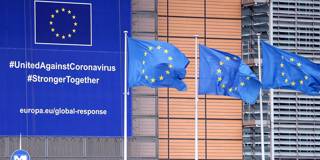The COVID-19 crisis has created an opening for stronger collective European action. But policymakers must understand that the demands of voters across the continent for greater cooperation do not reflect an appetite for institution-building, but rather a deeper anxiety about losing control in a perilous world.
BERLIN – When COVID-19 struck Europe and forced millions of people into internal exile, many were overcome by a deep sense of loneliness. This reflected not only a craving to be reunited with friends and family, but also a broader feeling that their countries had been helpless and abandoned in the face of the global pandemic. This sense of rejection is profoundly affecting the individual psyches and worldviews of Europe’s citizens.

BERLIN – When COVID-19 struck Europe and forced millions of people into internal exile, many were overcome by a deep sense of loneliness. This reflected not only a craving to be reunited with friends and family, but also a broader feeling that their countries had been helpless and abandoned in the face of the global pandemic. This sense of rejection is profoundly affecting the individual psyches and worldviews of Europe’s citizens.